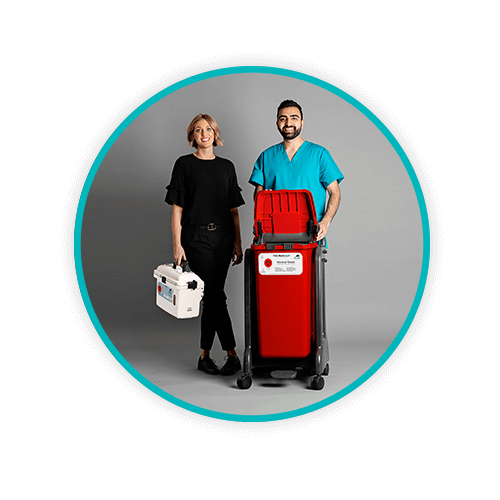Green Bay Healthcare Waste Management

When you hear the words ‘Green Bay’, most of us automatically think of the Packers. But this town is more than just an NFL football team. Green Bay is nestled on the southernmost shores of – you guessed it – Green Bay, a ‘finger’ of Lake Michigan in Wisconsin’s Brown County. It’s everything you imagine Wisconsin to be: green, green, and more green. In addition to the Packers, Green Bay is home to wildlife sanctuaries and wildlife and waterfowl preserves.
The city is also home to hospitals, specialty medical services, clinics, and healthcare providers. When it comes to Green Bay healthcare waste management tips, at the top of the list is “know the rules”.
Wisconsin takes its trash and recycling seriously!
As in any other county throughout the ‘Badger State’, Wisconsin counties not only meet, but often exceed state and federal guidelines when it comes to medical waste management. The goal is to render as much waste as non-hazardous as possible. Biohazard waste management in Green Bay is carefully managed and overseen by local, state and federal regulatory agencies.
Take advantage of a number of tips to help make your healthcare waste management decisions easier, safer, and compliant.
Tips for compliant biomedical waste management
01 / Familiarize yourself with agencies involved in developing Wisconsin’s healthcare waste management rules. For example, Wisconsin’s Department of Natural Resources (DNR). The state provides a fact sheet describing basic regulations of medical waste rules for the state based on these regulations. On the DNR website, healthcare facilities can find information regarding administrative codes and statutes for medical as well as infectious waste.
02 / Know the minimum safety-related requirements based on DNR’s regulations. This is applicable to all generators including individual households. Topics covered (NR 526.06 through NR 526.13) include separation and containment of waste and infectious waste. It also covers handling, storing and transferring infectious waste, and transportation and shipping of infectious waste. These regulations also provide minimum requirements for treatment and disposal of infectious waste. Though the reading can be rather dry, medical waste management regulations are also fully covered by administrative codes of Wisconsin’s State Legislature. A quick search using key terms ‘medical waste’ can be found here.
03 / It may seem obvious, but know the difference between “regular” and biohazard or infectious waste. Per Wisconsin’s definition, medical waste is defined in four categories: hazardous, infectious, radioactive, and “other general waste”. Infectious waste is waste of any type that contain pathogens that might cause illness or disease in a human.

04 / Even though a relatively small amount (the EPA estimates between 10% and 15%) of medical waste is deemed infectious, the potential to cause harm is extreme. Body fluids, human tissue, bulk blood products, scalpels, syringes, and sharps are just a few of the types of infectious waste produced by healthcare facilities that include hospitals, outpatient clinics, private physicians’ offices, veterinary facilities, nursing homes, and so forth. Adhere to guidelines regarding handling and segregation provided at your facility. Be aware of local, state and federal guidelines in regard to segregation, handling and disposal of potentially biohazardous waste.
Green Bay healthcare waste management regulations focus on compliance. Knowledge of the rules applies to everyone on staff from management down to housekeeping. Every employee in a healthcare facility must be aware of waste segregation, especially when it comes to biomedical waste management processes.
05 / Wisconsin’s state legislature specifies that infectious waste must never be mixed with non-infectious waste (NR 526.06). Is your staff trained in identification of potentially infectious waste? Do they know how to protect themselves when handling infectious waste? Are they using bags displayed with biohazard waste symbols? Are they aware that they are not allowed to transport infectious waste and other waste on the same cart or in the same vehicle unless they’re clearly separated and identified?
06 / Follow guidelines when it comes to sharps. Sharps containment is mandated in Green Bay and throughout Wisconsin to be “contained in rigid, puncture-resistant labeled containers made of materials including but not limited to metal or rigid plastic, designed to prevent the loss of the contents and labeled with a visible biohazard emblem or with the visible words “biohazard”, “sharps” or “infectious waste”.(NR 526.07)
07 / When it comes to minimum requirements for storage of infectious waste, did you know that Wisconsin law specifies that no one can maintain or operate a storage facility containing infectious waste unless certain requirements are met? For example, wooden floors or carpeting may not be used in a storage area and the storage area must be designated only for infectious waste in their containers? Not only that, but the storage area can’t be exposed to weather and is limited to authorized personnel. [NR 526.09(4)]
08 / Medical waste management in any state, including Wisconsin, also means medical waste reduction. As such, medical facilities are responsible for adoption of written medical waste reduction policies. The goal is to reduce the amount of medical waste generated by that facility. You’ll find the specifications under Wisconsin’s legislative Medical Waste Reduction Policy (NR 526.17). This isn’t a suggestion. It’s the law.
09 / Avoid penalties and fines for non-compliance. Medical waste management laws (DNR) can mandate penalties of up to $25,000 for each day (per violation) that a violation persists. Reduce the risk for fines and penalties by properly packaging biohazard and other medical waste for transportation in compliant, rigid containers. Categorize medical waste. Waste audits and proper waste stream segregation is essential. Never put hazardous waste in a sewer, as you will be cited for doing so. Dumping any type of hazardous waste can get you jail time.
10 / Take the time to properly train every employee. Fines for inadequate employee training is applicable. The responsibility of all medical waste generators who may deal with the handling, dispensing, storage, collection, and disposal of hazardous waste must train their personnel. Training sessions must be documented.

Daniels Health supports Green Bay healthcare waste management
Biomedical waste management is serious business. Daniels Health provides the vast resources, services, and products to ensure medical waste management protocols in Green Bay and throughout the state of Wisconsin are followed. Protect your employees from injury or exposure to potentially hazardous substances. For more information about Daniels Health or how we can help you maintain compliance in Green Bay, contact us!
Let's Talk!
Your time is valuable, and we don’t want to play hard to get. You can either phone us directly on the details listed on our contact page, or feel free to fill out this short form and one of our team members will get back to you as quickly as possible.
